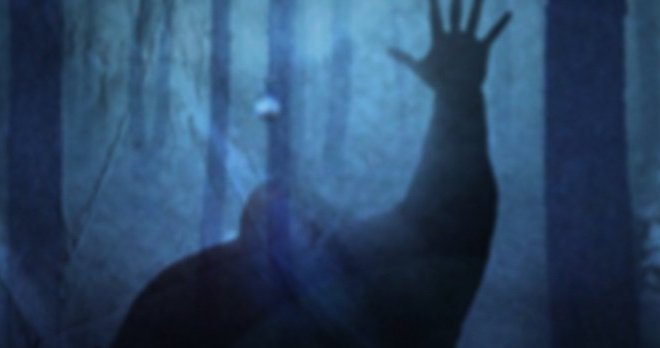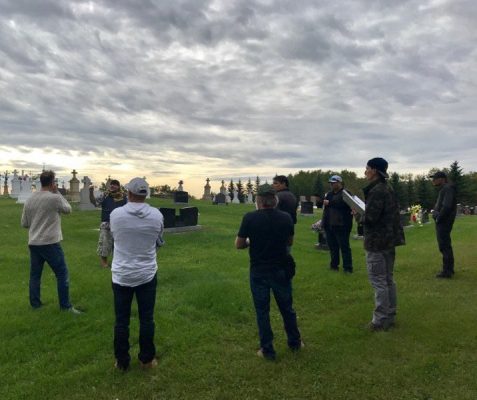EIFF REVIEW: Vegreville-filmed Drama Probes Old Ukrainian Wounds
Posted on October 7, 2020 By Colin MacLean Entertainment, Film, Front Slider
 It is Ukraine – the year is 1943 and the German army has broken through the lines and is systematically slaughtering everyone in a local village.
It is Ukraine – the year is 1943 and the German army has broken through the lines and is systematically slaughtering everyone in a local village.
The first images we see in Troy Ruptash’s film They Who Surround Us are fragmented and disconnected. They will come together in the mind of the film’s central character Roman (played by Ruptash – who also wrote and directed), as the film progresses. A distraught mother is fleeing through the forest pursued by an armed soldier. With her are her fearful seven-year-old son Roman, desperately clutching a rosary, and a tiny baby wrapped in blankets. When they reach an uncrossable river, the boy is told to run and hide and the baby is lovingly placed, Moses-like, in the river and floats away. The mother turns to await her fate.
It’s a gripping opening to a leisurely, melancholy, but often touching film that strums the heartstrings as a bandura might be stoked by the legendary Ukrainian minstrel – the Kobzar.
We are suddenly transported to 1987 and what appears to be a large farm nestled in the gently rolling hills, small lakes, trembling Aspens and fescue grasslands. Roman, now a middle-aged farmer, his wife and eight-year-old child Mykola are laughing and talking as they drive one of the dusty back roads of the area. You can hear a song from Alberta country star Brett Kissel on the radio. Their happiness will be short-lived.
Producer-writer-star Ruptash brought his 40-strong cast and crew to Vegreville, Alberta, a year ago last September. Although he grew up in the area, Ruptash is now Los Angeles-based and has had a busy stage and film career (Mad Men, CSI, The Young Pope). The financing for the film came from various sources but was booted into production when he was awarded a substantial sum in a “Hometown Heroes” movie contest. The director says the film is his way of saying thank you to the people of the area, and celebrating the stories passed on to him by his family.
 When Roman’s wife Kalyna is killed in a brutal accident on the farm, the man is destroyed. He is already plagued by vestigial memories of his doomed dash though the forest at his mother’s side, and witnessing her death at the hands of the soldier. Dark thoughts he had blocked out come flooding back, including the long ago death by bullets of his Uncle Stefan (Michael Sech), a freedom fighter who died in his nephew’s arms.
When Roman’s wife Kalyna is killed in a brutal accident on the farm, the man is destroyed. He is already plagued by vestigial memories of his doomed dash though the forest at his mother’s side, and witnessing her death at the hands of the soldier. Dark thoughts he had blocked out come flooding back, including the long ago death by bullets of his Uncle Stefan (Michael Sech), a freedom fighter who died in his nephew’s arms.
“They will beat us and try to destroy us. Some of us will die but we will rebuild our lives,” were his dying words.
Roman comes apart. He sees soldiers in German uniforms crossing the road in front of him. A mysterious woman in a cape sings in the woods at night. He is awakened from his troubled sleep by the sound of gunfire. His tight-knit family tries to help but he is beyond that. He begins to drink, and is stopped by the police, with his son in the car, when he burns through a stop sign. When it becomes obvious that he can no longer look after his bewildered son, his family takes over the child’s care. At one point Roman strides into the packed local church to demand that his son be returned to him.
Slowly out of this emotional turmoil, with the help of the church and his loving family, he begins the process of putting his life back together.
Ruptash uses a cast of both professionals and amateurs and has chosen extremely well – there is no discernible difference between the two. Playing Mykola is eight-year-old Daniel Mazepa, who has had little stage experience. He attends St. Matthew Elementary School in Edmonton, and is fluent in both Ukrainian and English – as is obvious in the film. With his large expressive eyes set in an animated face, Mazepa displays a wide range of emotions, from tender family interplay through fear, confusion and wrenching heartbreak. On the other end of the scale is Ali Libert, who plays Mykola’s aunt. She’s an award-winning Canadian actor with a long list of appearances (Bomb Girls). With a quiet breathy voice and unforced presence she is a natural screen performer bringing considerable subtlety to her scenes. Ruptash, who appears throughout the movie, is a strong presence.
They Who Surround Us is gorgeous to behold – the scenery almost taking on the importance of a human character in its storytelling abilities. The lovely land around Vegreville comes to vibrant visual life. Moroccan cinematographer Kamal Derkaoui comes trailing a distinguished list of international films and television programs. His artistry is immediately obvious from the first few frames of the film. Endless fields of vivid Alberta green flow through his restless lens as they slowly turn to an early blaze of colour. A huge harvest moon fills a darkening azure sky; a forest becomes a haunted vista where restless ghosts materialize; a stark white Byzantine church stands out against a verdant forest.
Despite throwing the early scenes into black and white (in Ukrainian with English subtitles) the timelines are sometimes difficult to follow. Also, the deliberate pacing of the film may wear down some viewers. But the film’s heart remains in the right place, and the ending, while never really unexpected, has enough uplift to make all the waiting worth it.
The in-person screenings for Those Who Surround Us are SOLD OUT at the Landmark Cinemas 9 City Centre this weekend, but you can watch from home on Super Channel FUSE. Click here for details.











